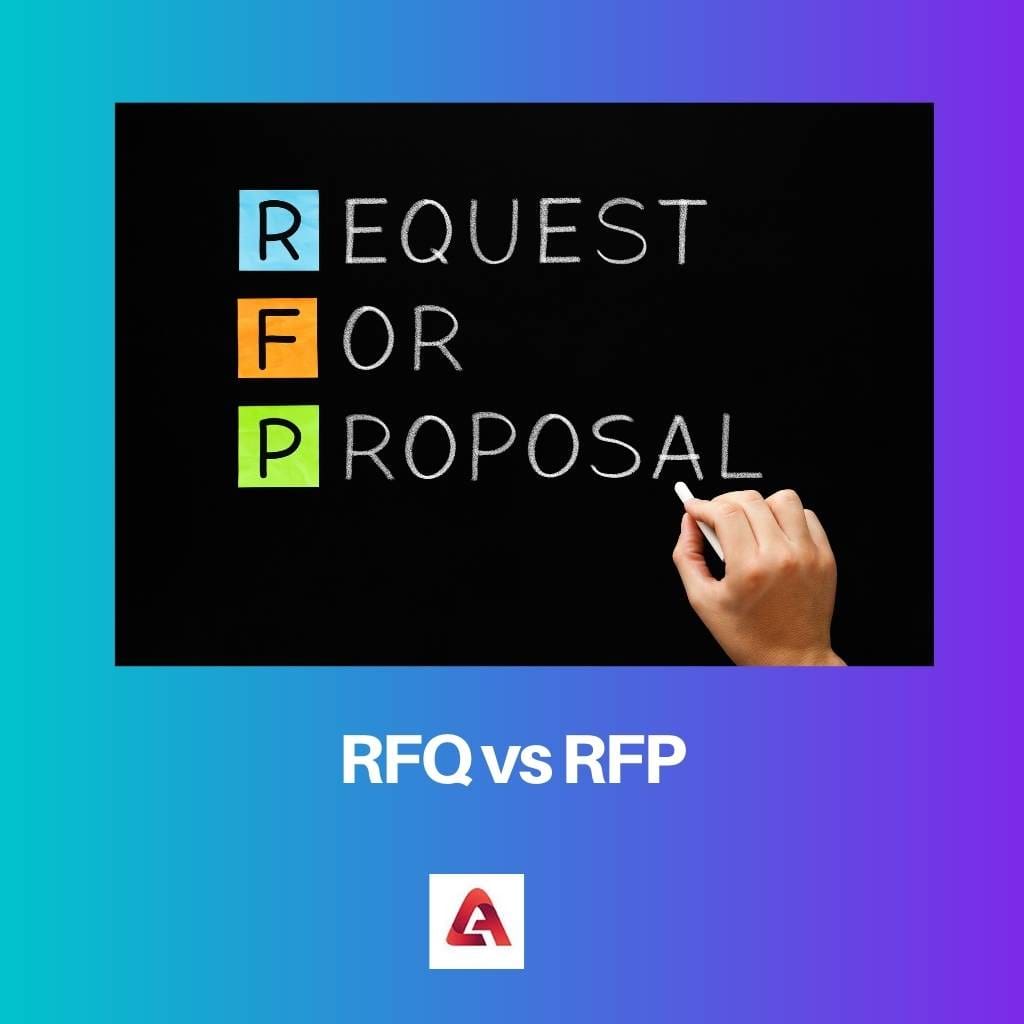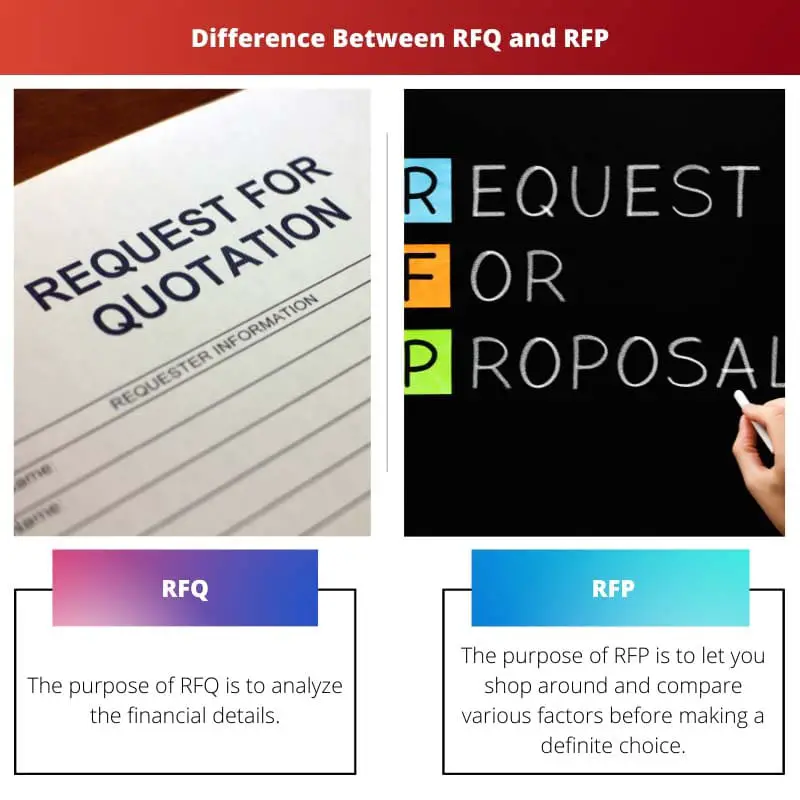While they might seem similar, they do have different meanings. These two terms perform different purposes within the procurement process. These are related to the process of giving and receiving information between two companies. Both RFQ and RFP belong to the family of RFx documents.
Key Takeaways
- RFQ is a request for a quotation, while RFP is a request for a proposal.
- RFQ is used to compare prices of products or services, while RFP is used to evaluate the proposed solutions to a problem.
- RFQ requires a detailed specification of the requested product or service, while RFP requires a detailed description of the problem to be solved.
RFQ vs RFP
RFQ (Request For Quotation) is a type of document which organizations use to find the prices of products or services. Financial information can also be analyzed through RFQ. RFP (Request For Proposal) is a document sent to the vendors by the companies. The purpose is to collect data.

An RFQ is a request for a quotation of price and information on payment methods. The buyer gets the exact number for the exact type of product or service he/she wishes for. An RFQ contains a list of requirements so that the vendor can provide the price for each requirement separately.
In an RFP, the questions should be very specific. Through this, buyers can get specific information about the vendors and their experience. The buyer can also mention the problems he/she is facing and ask for suggestions and solutions from the vendor.
The vendors can offer a particular strategy, and the buyer can perceive their skills based on the solution they provide.
Comparison Table
| Parameters of Comparison | RFQ | RFP |
|---|---|---|
| Full form | The full form of RFQ is Request For Quotation. | RFP stands for Request For Proposal. |
| Purpose | The purpose of RFQ is to analyze the financial details. | The purpose of RFP is to let you shop around and compare various factors before making a definite choice. |
| Style | Style of writing RFQ should be structured and prescriptive. | The style of RFP should be direct and maintain the formal language. |
| Asks | RFQ should contain questions to know the cost of the requirements. | In RFP, one should ask specific questions to get details about the service, product, and business. |
| Advantage | Through RFQ, one gets to know the specific price and does not get overwhelmed with other details. | Through RFP, the buyer gets to compare all the offers and capabilities and clearly understand to make a decision. |
What is RFQ?
A Request for Quotation, or RFQ, is a document that companies use to ask for the price of services or products. Before the procurement of goods, this document explains that the buyer wants to buy and asks for the price from the vendor. The RFQ will tell the requirements in detail with quantity.
A buyer or a company will send the RFQ to the vendors or other companies with whom the buyer is interested in doing business. After getting the RFQ, the vendors will send a response which is the quotation of the price in detail. From these responses, the buyer can decide the best deal for him/her.
Not only the cost, but this application can also include a detailed list of products, and their features, quantity of the products, methods of payment, and expected delivery date.
RFQ is asked from vendors before making a large-scale purchase or before signing a big long-term contract. This document gives the buyer an opportunity to compare all the vendors’ offers and get a reasonable and best business deal.

What is RFP?
RFP, or Request for Proposal, is a document that companies send to collect information from the vendor about services rather than products. RFQ only asks for the price, but RFP is a bit more complicated as they ask for more information.
In the RFP, the buyer will attach a few details about the project to see how the vendors will come up with strategies. Since the buyer will reach out to various potential dealers, the buyer will get to see different strategies. The RFP can contain questions about contractors as well.
RFP should be straightforward and precise. Through RFP, the buyer gets to know the vendors’ preferences, and thus the buyer can compare the deals based on not only the price but also on the priorities of the vendors.
RFP can ask for examples of the vendors’ previous works. To be sure and confident, the buyer can ask for details of previous similar projects.
Through RFP, the buyer gets a chance to know about the skills and capabilities of the vendors and then compare those to get the best results.

Main Differences Between RFQ and RFP
- RFQ stands for Request for Quotation, and RFP stands for Request For Proposal.
- RFQ asks for the cost of a particular service or product, and RFP asks for detailed information and even proof about the services.
- RFQ is to get the financial details, whereas RFP is for other details which can help to compare various other vendors, and thus the buyer can choose the best agreement.
- RFQ should be well structured and prescriptive. While writing RFP, the buyer should be very formal and state his/her questions very directly. The buyer needs to ask whatever he/she requires to know about the services.
- RFQ only requires the cost of the whole project in detail, so the vendor can not mislead the buyer with other irrelevant information. On the other hand, RFP lets the buyer get a peek at the capabilities and efficiencies of the vendors.

- https://pubsonline.informs.org/doi/abs/10.1287/mksc.1070.0281
- https://jsf.pm-research.com/content/12/4/90.short

I find this article enlightening, as it clarifies the specific uses of RFQ and RFP, which can be beneficial for those navigating the procurement process.
This piece offers a discerning evaluation of RFQ and RFP, shedding light on the nuanced details that underpin their distinct purposes in the context of procurement procedures.
I appreciate the detailed explanation that helps distinguish the differences between RFQ and RFP, making it easier to understand their different functions and purposes.
I completely agree with your observation, Martin. The comparison table included in the article is very useful for highlighting the distinctions between RFQ and RFP.
The detailed descriptions of RFQ and RFP are incredibly insightful, providing a rich understanding of how these documents serve different functions in the procurement process.
Absolutely, Wendy. The article’s meticulous breakdown of RFQ and RFP is a boon to professionals seeking to expand their knowledge of procurement practices.
The comprehensive explanations for both RFQ and RFP have greatly enhanced my understanding of their respective functions, paving the way for more informed decision-making in procurement processes.
I’m pleased to hear that, Joanne. Having a deeper understanding of RFQ and RFP is instrumental in making sound choices when engaging with vendors and considering business offers.
The lucid explanation of RFQ and RFP is immensely helpful, equipping readers with a profound understanding of the divergent roles these documents play in the procurement landscape.
Indeed, Miller. The article effectively dissects the finer points of RFQ and RFP, fostering a deeper comprehension of their distinct objectives in the procurement realm.
I couldn’t agree more, Miller. Gaining clarity on the distinctions between RFQ and RFP is fundamental for procurement specialists to optimize their strategic interactions with vendors.
The comprehensive delineation of RFQ and RFP is invaluable for professionals navigating the intricacies of procurement, enabling them to make well-informed decisions in their engagements with vendors.
Well said, Alexa. The profound elucidation of RFQ and RFP in this article empowers professionals to exhibit astuteness and discernment in their procurement endeavors.
The clear distinction outlined between RFQ and RFP offers valuable insights into the unique roles these documents play in the procurement of goods and services.
Absolutely, Will. It’s essential for professionals in procurement to have a strong understanding of the nuanced differences between RFQ and RFP in order to apply them effectively.
The comparison table effectively summarizes the contrasts between RFQ and RFP, providing readers with a quick reference to differentiate between the two.
The article’s in-depth analysis articulates the precise differences between RFQ and RFP, allowing professionals to grasp the intricate nature of these documents with clarity and acumen.
Indeed, Jeremy. The lucid comparison between RFQ and RFP is a valuable resource for procurement specialists, enabling them to navigate the complexities of vendor engagement with confidence.